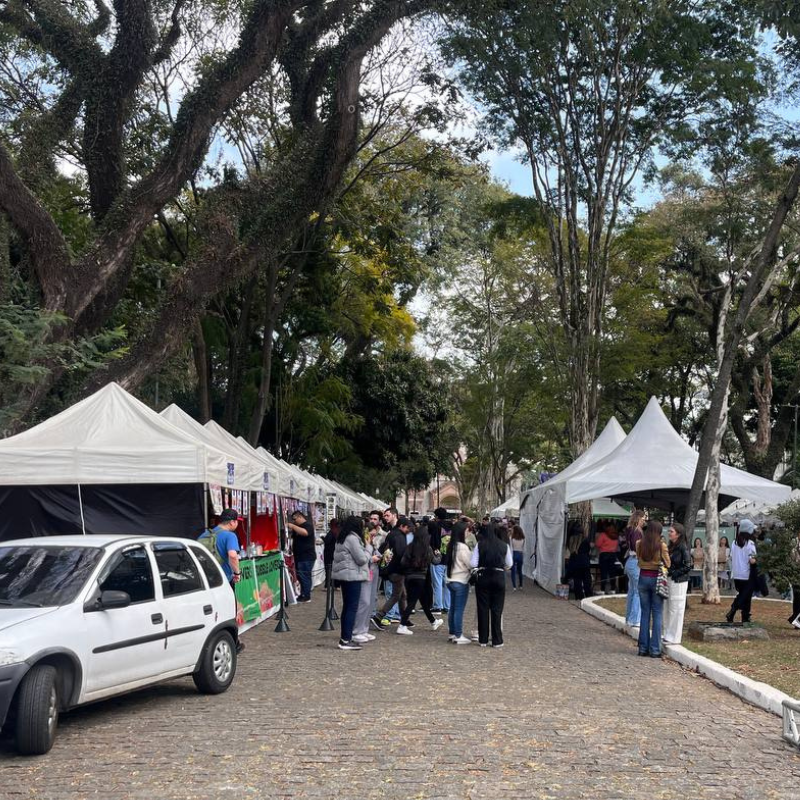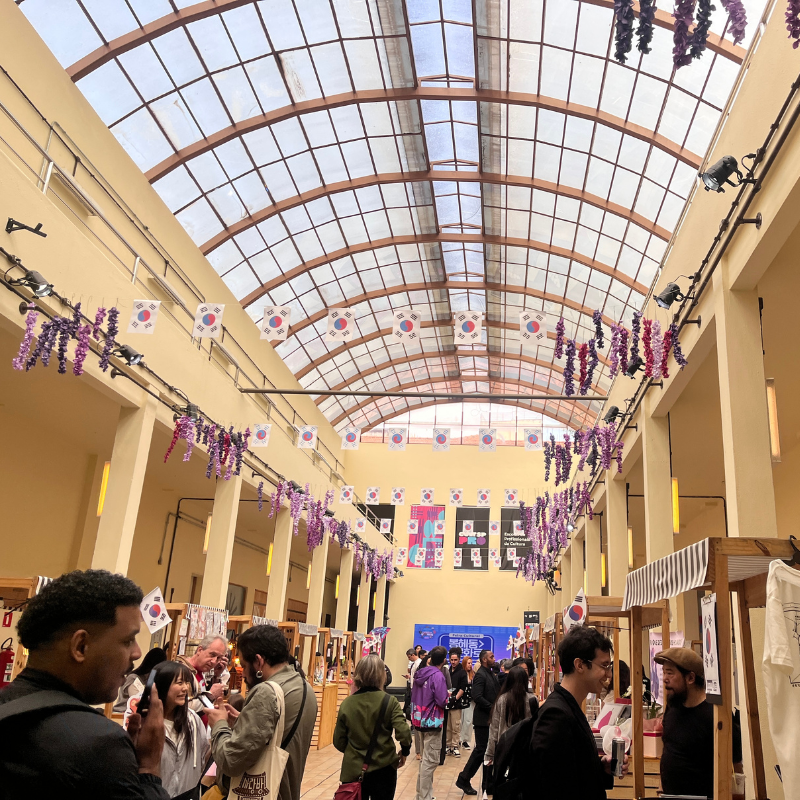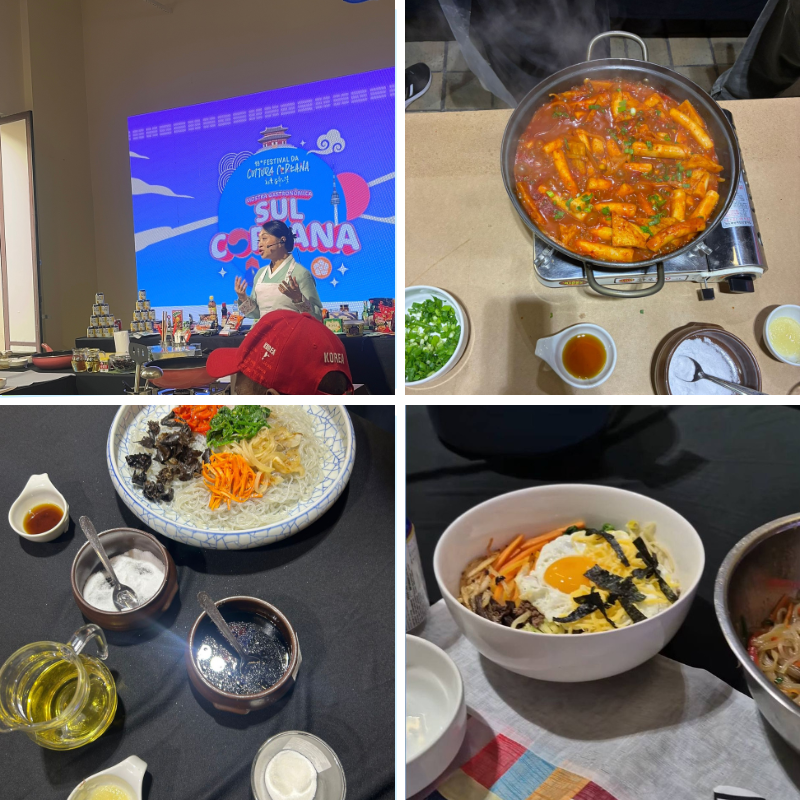A journey to Korea without leaving Brazil: my experience at the largest Korean Festival in Latin America
2025-08-17On August 16 and 17, I lived one of the most remarkable experiences of my journey as an Honorary Reporter: closely following the Korean Culture Festival in Brazil, held in the Bom Retiro neighborhood of São Paulo. More than just a coverage, it felt like diving into a celebration that brought together tradition, modernity, and emotion in the same space, at an event already considered the largest in Latin America dedicated to Korea. Being there made me feel that, for a few hours, I had truly crossed the ocean and stepped into Seoul, without ever leaving the city where I was born.
Right from the arrival, it was clear that this would not be just another festival. Early in the morning, at 10 a.m., Praça Coronel Fernando Prestes was already filled with a diverse and vibrant crowd. Entire families were eager to discover new flavors, young k-pop fans waved lightsticks and colorful signs, locals mingled with the curious crowd, and enthusiasts of Korean culture traveled from other states just to make sure they wouldn’t miss the event. The energy was contagious, and the feeling was that no one was in a hurry to leave, since the activities went on until eight at night, always full of surprises and unforgettable moments.
The stands set up for the festival were a whole experience on their own. Beyond the typical foods that already sparked hungry looks and cheerful lines, each booth carried deep cultural and symbolic meaning. I watched with emotion as elder members of the Korean community wrote Brazilians’ names in hangul for free, a simple but powerful gesture that lit up the eyes of everyone who received the paper. At the Jinro booth, curiosity about trying soju for the first time brought out laughter and playful comments, while at the AT Center stand, long lines formed for snacks and drinks flown in straight from Korea, as if each package was a tiny piece of that faraway country.

On the main stage, right at the heart of the square, the celebration came alive even more. The program moved between different cultural expressions, from k-pop to tradition. I saw high-energy cover dance groups, Korean women bringing tears to the crowd with a delicate choir performance, instrumental presentations echoing centuries of history, and the collective excitement of the random play dance, where everyone danced together like old friends. Tradition also had its place with an impressive samulnori performance, where drums and gongs echoed in a rhythm so powerful it felt like the soul of Korea had been brought straight to São Paulo. Another highlight was the taekwondo showcase, which not only revealed the technique and discipline of the martial art but also captivated the audience through the philosophy carried in each movement. But nothing surpassed the climax of the evening: at 7 p.m., the k-pop group YOUNITE took the stage and turned São Paulo into the stage of hallyu, in their very first performance in Brazil. The screams, the applause, and the electrifying atmosphere showed that the connection between Korea and Brazil is already bigger than any geographical border.
Between one performance and another, I also took the chance to explore the neighborhood and let myself be carried away by the complete experience. I stepped into a Korean fried chicken restaurant, the very same we so often see in k-dramas, and lived a scene that felt as if it had come straight off the screen: eating crispy pieces with my hands, protected only by plastic gloves, without any concern for formality. It was a pause that made me realize how Korean culture is not only on stage or at the festival stands, but has already blended into the daily life of the city, becoming part of São Paulo’s routine.
The program spread even further with activities at the Oswaldo de Andrade Building, which became a special extension of the festival. Right at the entrance, I was welcomed by a music and poetry performance organized by illustrator Ing Lee, bringing an intimate and sensitive touch to the event. Walking through the building, I came across the Korea Exchange Fair, where universities presented everything from undergraduate and graduate programs to language courses. I was amazed to see so many young people interested in learning Korean, studying communication, technology, or health, or simply dreaming of living an academic experience on the other side of the world. It was inspiring to see how the festival also sparked aspirations.

Inside the building, there was also an entire universe of Korean brands already present in Brazil. From T-shirts with mysterious prints by an artist who prefers to remain anonymous, to handmade soaps inspired by hanbok, and even fragrances in k-drama-themed packaging evoking familiar scents like coffee or melon ice cream, it was impossible not to be charmed by the creativity and attention to detail. I also had the chance to attend lectures about the Korean community in Brazil and the long history of Korea, ranging from the Joseon era to the global impact of hallyu, a reminder that behind every song, every drama, or every dish, there is a past and a profound culture worth telling.
The closing of my experience was so special that it left a lasting mark in my memory. I was invited by the Korean Consulate to take part in a cooking workshop alongside Dona Regina, from the restaurant Portal da Coreia. Together, among cameras, pots, and laughter, we prepared traditional dishes such as bibimbap, japchae, and tteokbokki, in a warm atmosphere that brought together press, influencers, and guests. The moment became even more symbolic with the participation of the Korean Consul General in São Paulo, Jin-weon Chae, who cooked with us and shared not only the food but also the joy that filled every moment of this festival.

The Korean Culture Festival in Brazil was not just an event to be recorded in photos or videos: it was a complete immersion, a cultural journey without a passport stamp, but one that left memories just as intense as an international experience. For me, it felt like traveling to Korea without leaving São Paulo, surrounded by flavors, sounds, stories, and encounters that showed how deeply Korean culture is already rooted in the hearts of Brazilians. It was a unique experience, one that I will cherish not only as a reporter but also as an admirer of this very special bridge between Brazil and Korea.
How about this article?
- Like2
- Support0
- Amazing1
- Sad0
- Curious0
- Insightful0


